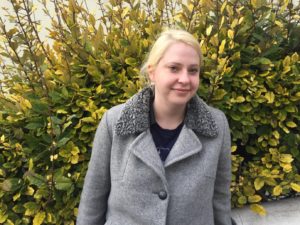Brighton and Sussex University Hospitals (BSUH), which runs the Royal Sussex County Hospital in Brighton and the Princess Royal Hospital in Haywards Heath, is marking National Apprenticeship Week (6-10 March) by highlighting its work to take on apprentices and help them into full time employment.
Over the past 18 months, BSUH has appointed 30 direct-entry apprentices – as Healthcare Assistants as well as in facilities and estates and administration roles. As well as gaining valuable on the job experience, during their apprenticeship year, direct entry apprentices also undertake a level two or three diploma.
Case study
From benefits to pharmacy administrator – how hospital apprenticeship became a turning point for one BSUH apprentice
In a few weeks, Ida Salonen will start a new, permanent job as a pharmacy administrator following a successful direct-entry apprenticeship at Brighton and Sussex University Hospitals Trust. She has a mix of feelings – a bit overwhelmed, but also proud of how far she’s come. She said:
“The apprenticeship has been a huge turning point in my life. I’d been on disability benefits for about three years and felt I had no real work experience to offer. I’d done some work as a chef and in bars. I’d also tried some work experience but it didn’t help to build my confidence and I didn’t really get any support.
“The hardest part was finding the motivation. But at the trust, there’s such a lot of support. They encourage you to try new things. They’re open and they ask you how things are going. They guide and support you, and they genuinely want you to be successful.
“Without the apprenticeship, I would never have got this job. I was insecure and felt I didn’t really know anything. I’m a little overwhelmed but I’m also proud that at this point in my life I have got a proper job.”
Ida has been recommending the apprenticeship programme to friends. But she tells them that for it to work, they need to be committed. “It’s a lot of hard work and you need to put in the effort.” She also makes sure they realise that while the pay is not high as an apprentice, the end result will be worth it. “I made a conscious decision,” she said, “that I would rather be poor for a bit but be able to go further in my career.”
Micki Lake, BSUH secretarial services manager, has watched Ida flourish during her apprenticeship. Micki has worked with six apprentices so far and all have gone on to full time employment. She said:
“Ida has come on leaps and bounds. She was rather thrown in at the deep end early on and she coped amazingly. She learnt very quickly and I think this has helped to improve her confidence.
“It’s a very symbiotic relationship. The apprentices are training and learning and we are getting some work in return. They’re all very enthusiastic and they need to be. There’s a lot to learn and they have to take exams.”
From April, the way the government funds apprenticeships in England is changing and large employers will have to pay a levy to invest in apprentices. BSUH will pay £1.3million and will be able to recoup this through apprenticeship training funding, which means more apprenticeships will be available.
Martin Kelly, BSUH apprenticeship programme co-ordinator, said that without the apprenticeship scheme, the trust would be missing out on some very good people.
He said:
“We must do this because, with all the pressures on the NHS, we need to ‘grow our own’. In my view the college model doesn’t work. Doing it this way, through apprenticeships, we’re giving people all the tools they will need.
“The apprenticeships offer a real opportunity for people who haven’t got a track record of skills that would land them a job within the trust. And they’ve grabbed them with both hands.”

